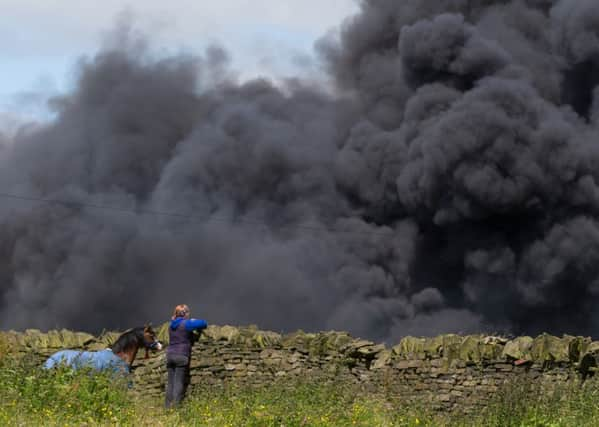Fires on region's farmland cause over £13m of damage


Farm fire claims cost more in the North East area, including the Yorkshire region, than in any other part of the UK last year, according to figures published by insurers NFU Mutual .
The insurer handled fire-related claims worth £13.1m from farms in the North East last year, up by more than 20 per cent on 2014.
Advertisement
Hide AdAdvertisement
Hide AdNationally, the total claim value grew by 14 per cent, to £47.9m.
Electrical faults were found to be responsible for almost half of 2015 fire claims, the insurer said, with arson and mechanical faults the next most common causes.
Tim Price, rural affairs specialist at NFU Mutual, said: “Fire remains one of the greatest hazards to the lives of farmers and with claims peaking in August and September, it’s important to be alert to the risks and have plans prepared and shared with family members and staff.
“The scale of these claims shows how important it is to take all possible steps to prevent fires breaking out, and to have clear plans to evacuate people and livestock safely in the event of a fire. Also, it’s vital to make sure you have the right sort of fire extinguishers maintained in good order so you can fight small fires safely.”
Advertisement
Hide AdAdvertisement
Hide AdThe second highest farm fire claims value was recorded in the South and East of England at £10.6m, followed by Scotland (£6.3m), the North West (£5.9m), the Midlands (£4.9m), Wales (£3.7m) and Northern Ireland (£3.4m).
To help guard against fire outbreaks on farms, NFU Mutual has compiled a checklist of safety measures, which is as follows:
Ensure there are sufficient fire extinguishers for the size of buildings and that materials stored are inspected and regularly maintained;
Ensure staff and adult family members know the location of fire extinguishers and how to use them;
Advertisement
Hide AdAdvertisement
Hide AdReduce the risk of arson by fencing-off straw stacks and farm buildings;
Store hay and straw at least 10 metres from other buildings;
Put in place an evacuation plan for staff and livestock;
Store petrol, diesel and other fuels in secure areas;
Schedule regular electrical safety checks;
And, invite the local fire and rescue service to visit to check water supplies and access routes.
Firefighters were summoned to tackle a major blaze on a farm in Nottinghamshire on Wednesday when flames took hold of a storage unit containing plastics at Oakham Farm in Walesby. At its height a total of nine fire engines, plus a number of specialist vehicles, were needed to fight the fire.
Advertisement
Hide AdAdvertisement
Hide AdAnother blaze, which started a fortnight ago, involved a former mushroom farm near Selby, North Yorkshire, where illegally dumped waste burnt for days as firefighters worked to spread out and extinguish the burning debris.
There have been 160 worker fatalities in agriculture over the last five years. The most common fatal injury related to workers being struck by moving vehicles.
The first reaction to a fire breaking out on a farm should be to call the fire and rescue service, NFU Mutual advised.
After placing an emergency call, the insurer recommends that if it is possible, someone should be sent to the farm entrance in order to direct firefighters to the scene of the fire as often it can be difficult for crews to pinpoint the exact location on arrival.
Other advice for farmers in the event of a fire includes being prepared to evacuate livestock in case the fire spreads and to prepare to use farm machinery to assist the fire service if requested.